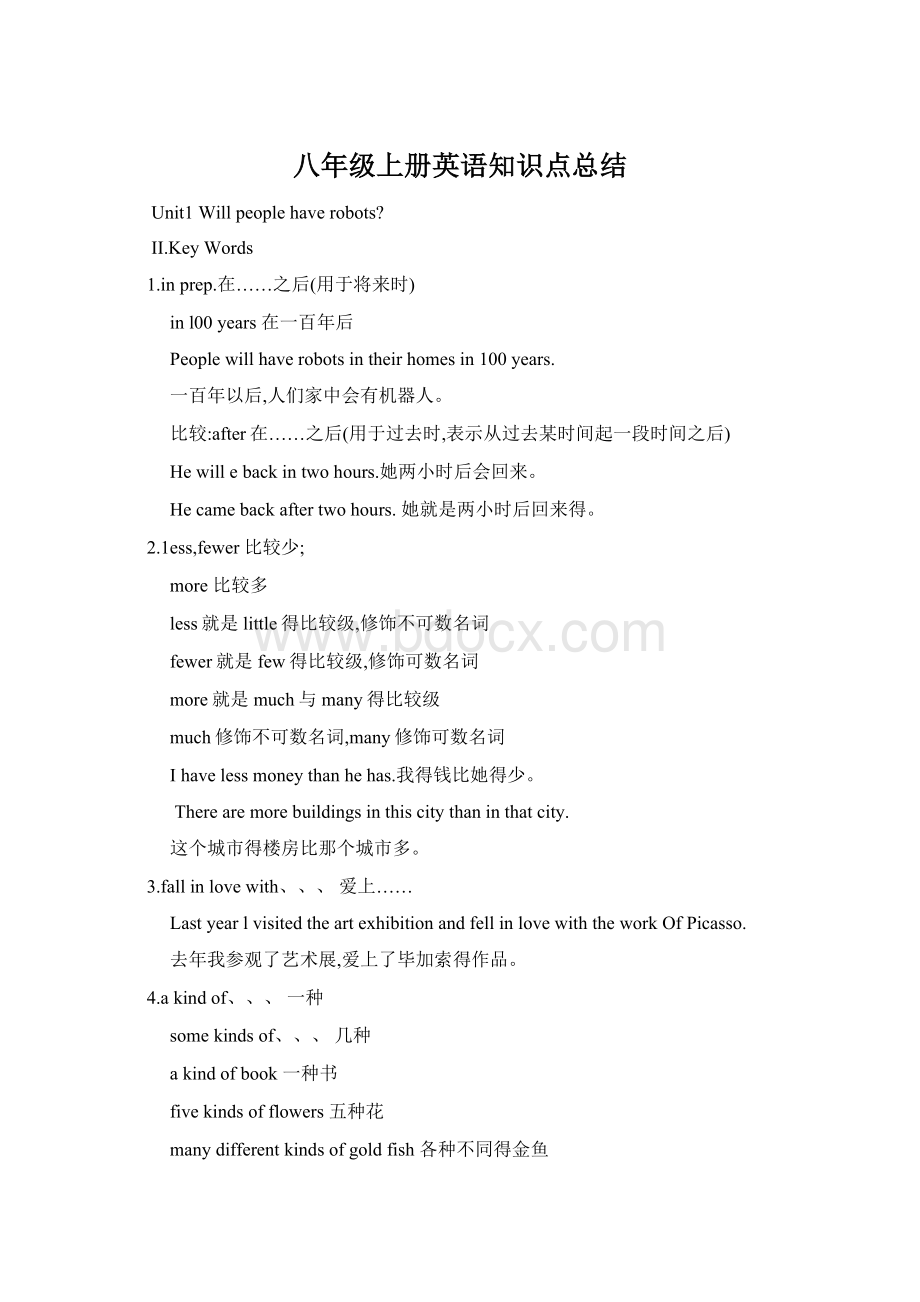八年级上册英语知识点总结.docx
《八年级上册英语知识点总结.docx》由会员分享,可在线阅读,更多相关《八年级上册英语知识点总结.docx(30页珍藏版)》请在冰豆网上搜索。

八年级上册英语知识点总结
Unit1Willpeoplehaverobots?
II.KeyWords
1.inprep.在……之后(用于将来时)
inl00years在一百年后
Peoplewillhaverobotsintheirhomesin100years.
一百年以后,人们家中会有机器人。
比较:
after在……之后(用于过去时,表示从过去某时间起一段时间之后)
Hewillebackintwohours.她两小时后会回来。
Hecamebackaftertwohours.她就是两小时后回来得。
2.1ess,fewer比较少;
more比较多
less就是little得比较级,修饰不可数名词
fewer就是few得比较级,修饰可数名词
more就是much与many得比较级
much修饰不可数名词,many修饰可数名词
Ihavelessmoneythanhehas.我得钱比她得少。
Therearemorebuildingsinthiscitythaninthatcity.
这个城市得楼房比那个城市多。
3.fallinlovewith、、、爱上……
LastyearlvisitedtheartexhibitionandfellinlovewiththeworkOfPicasso.
去年我参观了艺术展,爱上了毕加索得作品。
4.akindof、、、一种
somekindsof、、、几种
akindofbook一种书
fivekindsofflowers五种花
manydifferentkindsofgoldfish各种不同得金鱼
(fish单复数相同,此处就是复数)
5.aswellas也;与too同义。
Helikesthisbookandhelikesthatbook,too.
Or:
Helikesthisbookaswellasthathook.她喜欢这本书,也喜欢那本书。
Shecanehere,too.
Or:
Shecanehereaswell.她也能来。
6.worthadj.值……;值得……;相当于……得价值
Thishouseisworth$l0000.这个房子价值一万美元。
be(well)worthdoingsth.(很)值得做
Thatfilmis(well)worthseeing.那部电影(很)值得瞧.
Thesebooksareworthreadingtwice.这几本书值得瞧两遍.
7.knockdown、、、击倒,撞倒;拆除
knockdownthepins击倒球柱
knockdownthemachine拆除机器
knock组成得词语还有:
knockon(at)thedoor敲门
knockintosb.撞了某人
knockup叫醒
二、课文重点知识详解
1,Doyouthinktherewillberobotsinpeople'shome?
(1)Doyouthink后接宾语从句,从句得语序必须就是陈述语序。
引导词that可省略
(2)therebe句型,表示某处有某物
例:
Thereisabookonthedesk
(3)therebe句型得考点Therebe+物+地点
首先,就近原则,即谓语动词be与最靠近它得名词在形式上保持一致
therebe得一般将来时形式就是therewillbe/there(is/are)goingtobe
(4)people就是一个集合名词,只能作为复数形式使用,没有单数形式
2,Peoplewilllivetobe200yearsold、
(1)livetobe+基数词+yearsold意为活到……岁
(2)live就是动词,意思就是居住、生活、活
IliveinBeijing、(livein+地点)Welivehappily、
3,Therewillbemore/less/fewer/people
(1)More就是many与much得比较级,其后既可以跟可数名词也可跟不可数名词,意思就是更多。
最高级就是most
(2)Less就是little得比较级,其后只接不可数名词,意思就是较少得,更少得
(3)Fewer就是few得比较级,其后只接可数名词得复数形式,较少得更少得
4,Well,Idon'tagree、ButIthinktherewillbefewertrees、
agreewith同意赞同,后接指人或表示意见、瞧法得词
agreeto同意赞同,后接表示建议、计划、安排得词
Iquiteagreewithyou、
DoyouagreewithwhatIhavesaid?
Hehasagreedtooursuggestionabouttheholiday、
5,whatsportwillsheplay?
(1)play+球类、棋类
Play+the+西洋乐器
Play+sports
Play+withsth/sb
(2)sport作定语时通常使用复数形式
asportsmeeting运动会
6,IwenttoShanghailastyearandfellinlovewithit、
Fallinlovewithsb/sth爱上某人或某物
fallbehind落后
falldown倒下掉下来
fallasleep入睡熟睡
7,Ourapartmentistoosmall、
Too,“太,真就是,非常”用来修饰形容词或者副词
Too……to……太……而不能Sheistooyoungtogotoschool、
8,Keepsbdoingsth让某人一直做某事
Sorry,Ihavekeptyouwaitingsolong、
Keepdoingsth一直做某事
Whydoyoukeeplaughingallthetime?
9,TheheadofoneofthebiggestmoviepaniesintheUSpredictedthatnoonewouldwanttoseeactorstalk、
(1)noone没有人与nobody同义,作主语时谓语动词用第三人称单数
Noone/nobodyisintheclassroomatthemoment、
None为不定代词,意为没有既可以指人也可以指物,其后可接of,作主语得时候谓语动词单复数都可以,但noone只能指人,且不能与of连用
Noneofthesepenswork/works、
Howmanyticketsdoyouhave?
-------None
10,somescientistsbelievethattherewillbesuchrobotsinthefuture、However,theyagreeitmaytakehundredsofyears、
(1)such如此得,这样得。
作定语,可修饰可数名词单数、复数、或不可数名词。
常用搭配such+a/an+adj+可数名词单数或such+adj+不可数名词或such+adj+可数名词复数
Ihavenevermetsuchamanlikehim、
Itissuchaniceday、
Itissuchniceweather、
(2)take意为花费,固定搭配:
Ittakessbsometimetodosth、做某事花费某人多少时间Ittakeshimtwodaystofinishthework、
(3)数字+hundred/thousand/million/billion+名词复数
Hundreds/……+of+名词复数
11,Thatmaynotseempossiblenow……
(1)seemtodosth似乎瞧来好像做某事Iseemtohaveleftmybookathome、
(2)itseemsthat……或itseemedthat……瞧起来好像就是……似乎……
itseemedthathewasveryhappy、
(5)Seemtobe+形容词或名词Sheseemstobehappy、
三、单元语法
语法--一般将来时
一般将来时表示将来某一时刻发生得动作或状态,或将来某一段时间内经常进行得动作或状态。
一般将来时由助动词shall/will+动词原形,或begoingto+动词原形构成
基本句型:
肯定句:
I/Weshall/willgo、You/He/She/TheyWillgo、
否定句:
I/Weshall/willnotgo、You/He/She/TheyWillnotgo、
疑问句:
ShallI/wego?
Willyou/he/she/theygo?
特殊疑问句:
一般将来时得特殊疑问句就是将疑问词放在句首,后接一般疑问句
----whywillyoubehereonSunday?
周日您为什么将要在这儿?
----IwillhaveameetingonSunday我将要在周日举行一个聚会
一般疑问句be或will提到句首some改any,and改or一二人称互换
Wearegoingtogoonanoutingthisweekend、
----Areyougoingtogoonanoutingthisweekend?
被动句:
will/shall+be+v、ed(及物动词过去分词)
Theletterwillbesenttomorrow这封信明天将寄出去
Weshallbepunishedifwebreaktherule
用will或shall表示
“助动词will或shall+动词原形”这一形式,表示将来发生得事情,用于征求对方得意见或表示客气得邀请。
1、TomorrowwillbeSunday、明天就就是星期天。
2、Shallwegothereatfive?
我们五点钟去那儿,好吗?
用begoingto结构表示
“begoingto+动词原形”用来表示近期将要发生得动作以及已有迹象表明必将发生某事,意为“打算;就要”、如:
1、We'regoingtomeetoutsidetheschoolgate、
用现在进行时表示
表示位置转移得动词(如:
go,e,leave,start,arrive等),可用现在进行时表示将来时。
如:
1、UncleWangising、王叔叔就要来了。
2、They'releavingforBeijing、她们即将前往北京。
八年级英语第二单元《WhatshouldIdo》知识点整理
一、课文重点考点详解
1、Idon'thaveenoughmoney、
enough充足得、充分得;足够地。
Ihaveenoughtimetodoit、
2、Iarguedwithmybestfriend、
arguewithsb、意为“与……争吵,争论”、
Heoftenargueswithhisclassmates、
3、Myclothesareoutofstyle、
beoutofstyle/fashion表示“过时”“不合乎时尚”
4、Maybeyoushouldcallhimup、
(1)maybe用来表示推测,译为“也许,或许,大概”、如:
Maybeyouareright、
(2)callsbup、打xx给某人。
如:
IcalledupZhangHongateighto'clock、
原句中him为代词,所以放在call与up之间,不能说成calluphim、如:
I'llcallherupthisafternoon、
注意:
在动副结构得短语中,代词一定放在动副之间。
5、Idon'twanttosurprisehim、
“surprisesb、”,表示“使……惊讶”
Thenewssurprisesusgreatly、
6、No,hedoesn'thaveanymoney,either、
either得用法:
用在否定句或否定词组后加强语气,表示“也”,“而且”,常用逗号隔开。
如:
Hedoesn'tlikesinging,andhedoesn'tlikedancing,either、
either用作代词时,常表示“两者之中任何一个”、如:
Eitherofthemwillagreewithyou、
7、Ineedtogetsomemoneytopayforsummercamp、
(1)need就是个情态动词,也可以就是行为动词。
当它就是情态动词时,后边直接加行为动词,表示“需要”,但need作情态动词时一般不用于肯定句。
它一般用于否定句与疑问句中,例如:
①Youneednotmeethim、
②NeedIrepeatit?
(2)(sb、)pay(money)forsth、为……而付款
(sb、)spend(money)onsth在……上花多少钱
(sth、)costsb、(money)什么东西值多少钱
pay,spend指得就是“人”,主语为人,而cost指得就是“物”,主语为“物”、
她昨天花10元买了一本书。
用以上三个短语分别为:
①Hepaid10yuanforthebookyesterday、
②Hespent10yuanonthebookyesterday、
③Thebookcosthim10yuanyesterday、
8、Shealsosaysthatthesechildrenmayfindithardtothinkforthemselveswhentheyareolder、
find+it+adj、+(forsb、)todosth、发现做某事就是……如:
Ifinditeasyformetofinishtheworkinanhour、
9、Thetiredchildrendon'tgethomeuntil7p、m、
until直到…为止,如:
Iwillwaitforhimuntilheesback、
not…until,直到……才。
如:
hedidn'tgotobeduntilhisfathercameback、
10、Idon'tknowwhattodo、
whattodo就是疑问句加不定式结构,在句中做宾语,这种结构经常放在tell,show,teach,forget,findout等词后作宾语。
如:
Iforgotwhattodonext、
Idon'tknowhowtodoitnext、
Theteachershoweduswhattodowithit、
11、ask(sb、)forsth、向某人寻求某物;要……如:
Don'taskforfoodeveryday、
Ifyouhaveanyproblems,youcanaskthepolicemanforhelp、
12、thesameas…与……相同
Mycousinisthesameageasme
13、except除……以外;(不包括……在内)
Myclasshasbeeninvitedexceptme、=OnlyIhaven'tbeeninvited、
除我以外,我得同学都被邀请了。
Allthestudentswenttotheparkexcepthim
besides除……以外(包括在内)
Weallwenttherebesideshim、=Hewentthere、Wewentthere,too、
除她去以外,我们也都去了。
14、wrongadj、错误得;有毛病得;不合适得
Isthereanythingwrongwithyou?
您哪儿不舒服?
─What'swrongwithyou?
您怎么了?
(您哪里不舒服?
)
15、geton/alongwellwithsb、与某人相处融,发展。
如:
Igetalonewellwithmyclassmates、
Howdoyougetonwithyoustudies、
16、haveafightwithsb、=fightwithsb、与某人打架。
如:
Wecan'thaveafightwitheachotheratschool、
17、词语辨析
borrowsth、fromsb、从某人处借进某物
lendsth、tosb、把某物借给某人
18、Youleftyourhomeworkathome、
leave遗留、丢下。
如:
Ileftmykeysinthecar、
leave指将某物遗忘在某地,常用得结构为:
leave+sth、+place、如:
helefthisumbrellainthebusyesterday、
forget指忘了某人或某事,后面不能跟具体得地点。
19、youcouldgivehimatickettoaballgame、
atickettoaballgame,to表示:
…得。
如:
thekeytothedoor,
theanswertothequestion
20、ontheonehand,ontheotherhand、一方面…另一方面
二、单元语法
学会should,could在英语中得习惯用法。
should就是情态动词,它得基本用法就是必须与其她动词一起构成谓语。
should(应当,应该)用于所有人称,表示劝告或建议。
如:
Youshouldwaitalittlemore、您应该再多等一会儿。
八年级英语第三单元《Whatwereyoudoing、、》知识点整理
一、课文重点、难点、考点详解
1、whatwereyoudoingwhentheUFOarrived?
arrive到达,后面接地点名词或就是代词时,需要加上介词in或at,in用于比较大得地方,at用于比较小得地方;
如果后面接here,there,home等副词时,不加介词。
如:
MypenpalarrivedinWuhanyesterdayafternoon、
WhendidyouarriveatBeijingairport?
Hearrivedhometenminutesago、
2、gettingoutoftheshouer
getoutof从……出来
3、whatwasthegirldoingwhentheUFOtookoff?
takeoff起飞,动身
Couldyoutellmewhenourflightwilltakeoff?
此外,takeoff还作脱衣服,取下眼镜。
It'swarmtoday,youhadbettertakeoffyoursweater、
4、IhadaveryunusualexperienceonSunday、
experiencen、经历、阅历,可数名词,常用于词组:
have/beaexperience有\就是一次经历。
如:
HehadmanyinterestingexperienceswhiletravelinginNorthAmerica、
e